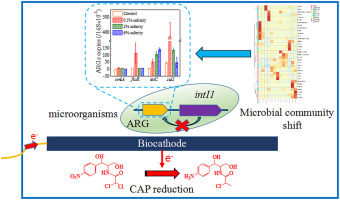Water Research ( IF 11.4 ) Pub Date : 2018-01-09 , DOI: 10.1016/j.watres.2018.01.020 Ning Guo , Yunkun Wang , Tiezheng Tong , Shuguang Wang

|
Pharmaceutical wastewaters containing antibiotics and high salinity can damage traditional biological treatment and result in the proliferation of antibiotic resistance genes (ARGs). Bioelectrochemical system (BES) is a promising approach for treating pharmaceutical wastewater. However, the fate of ARGs in BES and their correlations with microbial communities and horizontal genes transfer are unknown. In this study, we investigated the response of ARGs to bio-electrochemical treatment of chloramphenicol wastewater and their potential hosts under different salinities. Three ARGs encoding efflux pump (cmlA, floR and tetC), one class 1 integron integrase encoding gene (intI1), and sul1 gene (associate with intI1) were analyzed. Correlation analysis between microbial community and ARGs revealed that the abundances of potential hosts of ARGs was strongly affected by salinity, which further determined the alteration in ARG abundance under different salinities. There were no significant correlations between ARGs and intI1, indicating that horizontal gene transfer was not related to the important changes in ARGs. Moreover, the chloramphenicol removal efficiency was enhanced under a moderate salinity, attributed to the altered microbial community driven by salinity. Therefore, microbial community shift is the major factor for the changes of ARGs and chloramphenicol removal efficiency in BES under different salinities. This study provides new insights on the mechanisms underlying the alteration of ARGs in BES treating high-salinity pharmaceutical wastewater.
中文翻译:

高盐度制药废水生物电化学处理过程中抗生素抗性基因的命运及其潜在宿主
含有抗生素和高盐度的制药废水会破坏传统的生物处理方法,并导致抗生素抗性基因(ARG)的扩散。生物电化学系统(BES)是用于处理制药废水的一种有前途的方法。然而,尚不清楚BES中ARGs的命运以及它们与微生物群落和水平基因转移的相关性。在这项研究中,我们调查了ARGs在不同盐度下对氯霉素废水及其潜在宿主的生物电化学处理的响应。三个ARGs编码外排泵(cmlA,floR和tetC),一个1类整合素整合酶编码基因(intI1)和sul1基因(与intI1)进行了分析。微生物群落与ARGs之间的相关性分析表明,盐度强烈影响潜在ARGs宿主的丰度,这进一步确定了不同盐度下ARG丰度的变化。ARGs与intI1之间无显着相关性,表明水平基因转移与ARGs的重要变化无关。此外,在中等盐度下氯霉素的去除效率得到提高,这归因于盐度驱动的微生物群落的改变。因此,在不同盐度下,微生物群落迁移是影响BES ARGs和氯霉素去除效率变化的主要因素。这项研究提供了有关BES处理高盐度制药废水中ARGs改变的潜在机制的新见解。











































 京公网安备 11010802027423号
京公网安备 11010802027423号